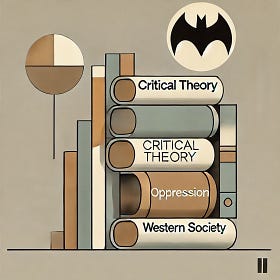One year on Substack
Reflections

I published my first article on this Substack on January 1st 2024. Overall, I’ve now published 52 posts (i.e., one a week throughout 2024). Because I typically write long articles, that’s over 150,000 words of content on a wide range of topics, including politics, evolution, artificial intelligence, social epistemology, philosophy, “misinformation”, and much more.
Although this has involved a lot of work, almost none of it felt like work. I thought I would like blogging—hence why I started—but it’s been even more rewarding than I thought it would be.
I would like to thank all those who read, support, recommend, and engage with the blog.
In this post, I will:
Review some stats
Identify some factors explaining the blog’s success
Briefly review the topics covered this year, including my most popular—and my personal favourite—essays
Reflect on why blogging is both rewarding and challenging
Describe my plans for the blog this year
Stats
As of January 2nd 2025, I have 11,000 subscribers. This is what the graph depicting the growth of subscribers over time looks like:
I’ve had 65,100 views over the past 30 days.
The blog is read across 50 states in the US and across 125 countries. A majority (51%) of subscribers come from the US. Surprisingly, I have as many subscribers in Italy as in the UK.
I have the most audience overlap with Nate Silver’s ‘Silver Bulletin’ (37%), Scott Alexander’s ‘Astral Codex Ten’ (18%), ‘The Free Press’ (18%), Noah Smith’s ‘Noahpinion’ (17%), Matt Yglesias’s ‘Slow Boring’ (17%), and Erik Hoel’s ‘The Intrinsic Perspective’ (13%).
Reasons for success
When I started blogging, my aim was to reach 500 subscribers by the end of the year. Relative to this goal, the blog has been a success. I think the blog has also been broadly successful relative to other metrics as well.
What explains this?
Because humans instinctively interpret the world in self-serving and self-aggrandising ways, we tend to take excessive credit for our successes and blame external factors (bad luck or other people) for our failures.
Let me try to avoid this tendency: by far the biggest reason this blog has been successful is simply good luck.
The main factor has been getting “recommended” by other writers. (When you recommend another writer on Substack, this directs some of your new subscribers to their newsletter).
7,000 (over 60%) of my subscribers have come from recommendations. Over 3,600 of these resulted from being recommended by Substack superstar Nate Silver. I’ve also benefitted from being recommended by many other great writers, including Eugenio Radin, Lionel Page, Ruxandra Teslo, Musa al-Gharbi, David Pinsof, Awais Aftab, Arnold Kling, Seeds of Science, Dan Gardner, and many more.
In addition, many other writers (especially Rob Henderson) have directed a large amount of traffic to the blog by linking to my articles.
I’m extremely grateful to all those who recommend and support the blog in these ways.
In terms of other factors explaining the blog’s success, I have the following traits, all of which seem to be conducive to successful blogging:
A high level of intellectual self-confidence that is no doubt frequently arrogant, if not outright delusional. (It’s good to be intellectually humble but publishing a blog involves an implicit assumption that you have something valuable to tell other people).
An ability to be unbothered by harsh criticism and occasional personal attacks. (Most of those who comment on your articles do so because they think you got something wrong. Although most of the feedback I get is high-quality, thoughtful, and respectful, I also receive a lot of outright hostile responses in absolute terms, which I think is pretty common among anyone who takes controversial stances on heated topics).
Obsessive interests in a wide range of ideas and topics. (This has many obvious benefits but also less obvious ones. For example, readers are much more likely to be interested in blogposts if the author is clearly passionate about the topic, which is especially important for, say, abstract philosophical issues).
An ability to write quickly, consistently, and relatively clearly. (I can write much more quickly and eloquently than I can speak, and I always have multiple different things I’m writing at the same time).
What I would call “conscientious anti-perfectionism”. (It’s difficult and maybe impossible to be a blogger if you’re a perfectionist. At the same time, the most common way of not being a perfectionist is by being lazy and tolerating mediocrity, which will result in bad work. What’s needed, then, is an ability to be highly conscientious at the same time as recognising when you hit rapidly diminishing returns when writing articles).
Not all successful bloggers have these traits, and they’re not sufficient for success. Nevertheless, my sense is that they’re fairly common among successful bloggers and—collectively, at least—quite unusual.
The year in review
The best thing about blogging is that you can write about whatever you want to write about. This year, the main things I wrote about were:
Why influential ways of thinking about problems like “misinformation” and “disinformation” are misguided
The psychological, social, and economic factors that explain why people believe what they believe
What evolution tells us about human nature and sociality
The role of experts in society
Politics (in the broadest possible sense)
By number of readers, my three most popular articles were:
Why do people believe true things?
Why do people believe true things?
·[Note: Sometimes, I try to write rigorous, well-argued essays based on ideas I have thought a lot about and feel confident in. Other times, I write up whatever inchoate ideas are floating around my consciousness to figure out what I think—and should think—about a topic. This falls in the latter category. You were warned].
America’s epistemological crisis
America's epistemological crisis
·“Science has been corrupted. We know the media has been corrupted for a long time. Academia has been corrupted. None of what they do is real. It’s all lies!… We really live, folks, in two worlds.… We live in two universes. One universe is a lie. One universe is an entire lie. Everything run, dominated, and controlled by the left here and around the worl…
My three most popular articles for paid subscribers were:
On becoming less left-wing (Part 1)
On becoming less left-wing (Part 1)
·I was born to left-wing parents, raised within a left-wing family, grew up with mostly left-wing friends, and then studied at universities filled with left-wing students and academics. Today, I work at one of the most left-wing universities in the UK, I live in one of its most left-wing cities, and people with left-wing views dominate my professional and social networks.
Contra critical theory
·When you start a Substack, you get a letter from management. It tells you that bloggers on the platform will occasionally be asked to write grumpy, conservative culture war polemics. Well, I recently got the bat signal, so here goes.
Can experts save the public from error?
Can experts save the public from error?
·Jennifer Allen and David Rand recently published an interesting article in Scientific American. It begins by reporting the scientific consensus that exposure to online fake news is rare and concentrated among a narrow fringe of active social media users with extreme worldviews. It then raises a
Excluding the ones already mentioned, the three essays I’m most proud of were:
Socialism, self-deception, and spontaneous order
How dangerous is misinformation?
The social construction of bespoke realities
Reflections on Substacking
Reflecting on the past year, here are some of the things that are most rewarding about blogging:
It’s difficult to overstate the benefits of being able to write about whatever you want to write about and to write about it in whichever way you want. You can achieve the former freedom as an academic once you’ve secured a permanent job (although the dream of a “permanent” academic job in the UK is looking increasingly fragile at many universities, including mine). However, you still need to write articles that conform to a very specific set of expectations to publish them in good journals. Here, you have absolute freedom. Moreover, in academia you will typically have to wait several years to publish a novel idea. Here, you can publish it immediately.
There are no formal “gatekeepers” here. This has disadvantages, obviously, including the lack of external quality control. However, it has countless advantages. The main one for me concerns my writing process. Whenever I know an article will need to be approved by some external authority to be published, it dramatically reduces my passion for the project.
One of the best things about Substack is the ability to find a community of highly intelligent, knowledgeable, like-minded thinkers with broadly similar interests. I benefit enormously from the feedback I get on my posts here. For this and other reasons, blogging is not just a means of communicating ideas. On Substack specifically, it provides a useful context for thinking through, developing, and revising ideas as well.
Here are some of the things I’ve found most challenging:
To build your blog’s audience, you will probably need to engage in self-promotion. This feels awkward. Self-promotion looks like—because it is—an attempt to raise your status and influence. Because status is relative and hence zero sum, people typically resent that. I struggle with this.
I have a full-time academic job that I take extremely seriously. I want to produce high-quality academic research and teaching. For this reason, I make sure that blogging doesn’t undermine these other goals. For the most part, that’s not an issue: because of substantial overlap in the focus of my research, teaching, and popular writing, these activities function as complements rather than substitutes. Moreover, I do most of my blogging in my spare time, which is easy because I enjoy it so much. However, maintaining this blog on top of a full-time, difficult job undoubtedly involves an enormous amount of hard work, which can sometimes be challenging.
2025
I have many things planned this year that I’m excited about.
In the immediate future, I will complete my “Debunking disinformation myths” and “Becoming less left-wing” series. I’m also planning a seven-part series on the theme of “Politics, truth, and ideology”, which will overlap with an advanced undergraduate course I’m teaching that connects abstract philosophical and social-scientific debates in political epistemology, broadly construed, to current political events and controversies. I’m also going to be writing more about issues that arise in connection with my forthcoming book, “Why it’s OK to be cynical”.
Reflecting on how I approach blogging, I think my biggest weakness is that I’m allergic to being concise. Nevertheless, one of my main goals with this blog is to produce in-depth articles on big-picture questions that will retain their value over time. Given this, I’m going to keep writing lengthy articles but I’m also going to publish more short posts, especially when it comes to politics and “current affairs”.
Once again, THANK YOU to all those who read, support, and engage with the blog. I’m looking forward to another year on Substack.














Dan -- Apart from luck (which you acknowledge played a role and without which all is lost), your meteoric rise on this platform can be explained by two other broad dynamics. One is real talent, a fresh perspective, something important and timely to say and the ability to say it; the other is energy, ambition, the mental (and physical, in the broad sense) means to match your material. Doesn't always happen. As a corollary, I also marvel at the clarity with which you discuss complex ideas, knowing first-hand that this is much harder to do than it seems. Complex ideas expressed in a way that is (relatively) easy to understand means that the writer has done their part. If you can do this quickly, then more power to you. Few can. Congratulations, and do keep it up. Alexis
I’m very grateful for your success and only slightly jealous. As your first paid subscriber let me explain my motivation and my perspective. I did so to encourage you to create a new kind of Substack in which an academic philosopher — of my approximate worldview (liberal in the dynamist sense per Acton, Hayek, Smith, Klein, Postrel, etc.), and disposition (humble), and with much greater knowledge than myself with respect to epistemology, dogma, propaganda, and human interdependence — was being paid directly by students. This insight I learned from Adam Smith who was critical of university endowments.
https://scottgibb.substack.com/p/adam-smith-on-higher-education?utm_source=publication-search
You have since removed the post that I considered “groundbreaking,” have you not? I don’t see this second earliest post outlining your philosophy of science class. Perhaps you were embarrassed by my enthusiasm or possibly the post conflicted with your university rules?
I learned of your writing through Arnold Kling. Arnold was and still is the King of Substack in my opinion, and probably the most veteran daily blogger on the platform; perhaps the earliest daily blogger still active on the web today. We can learn a great deal from him. https://scottgibb.substack.com/p/copying-a-veteran-daily-blogger?utm_source=publication-search
In addition to the reasons you’ve given for your blog being successful, I will add the following reason:
Your reading choices seem to be excellent and your magnitude of reading is very high — this puts you far ahead of other bloggers. You have a large reserve of important reading already completed. You can synthesize what you’ve read and get it down more quickly than other people who have read less well. Advice to myself and others: read more, write less.
My hope is that you and other academics leave academia — as it exists today — with its poor, perverse and distorting incentives — where professors are less responsive and less sensitive to the needs and wants of the community, especially students; and come to places like Substack, where you have to earn your students by producing valuable content. Of course this isn’t going to be a mode in which the-customer-is-always-right; no, but it probably will be a mode in which the incentives are aligned to listening to student feedback. And not just through teacher evaluations, easily set to the side. Each and every thing you say will be evaluated!
There is a pent up demand for better modes of education. Discourse platforms like Substack will likely play a huge role in the future of higher education, as well as primary and secondary education. I’m glad that people like you are at the forefront.
With all this said, let me say that 11,000 subscribers is only decent. You can do much better. You can improve this number by an order of magnitude with the right adjustments.
Good luck. I’ll be watching, and might even read your posts if they’re “good enough.”
And, congrats and thanks again for your contributions.